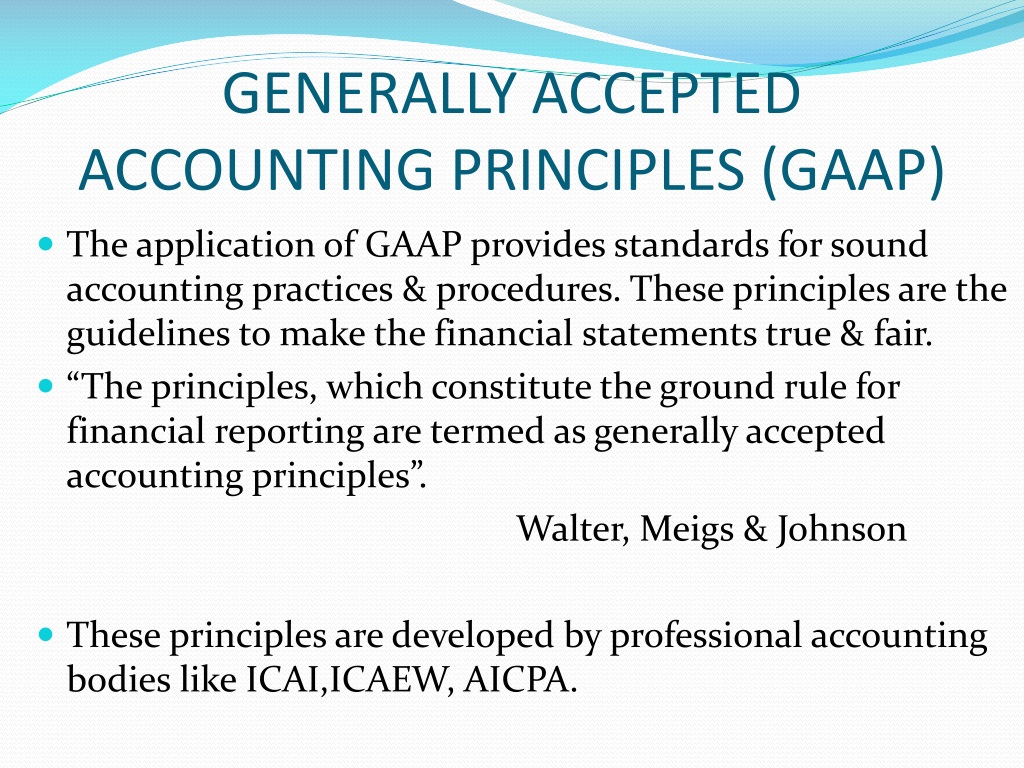

- #Generally accepted auditing standards list software
- #Generally accepted auditing standards list code
- #Generally accepted auditing standards list professional
Presenting assets at historical cost is justified by assuming productive assets will be used rather than sold. Going concern assumption assumes the company will continue in operation long enough to realize its investment in assets through operations (as opposed to sale).
#Generally accepted auditing standards list software
Generalized audit software Packaged computer programs used on a variety of computers during audit field work to read computer files, select information, perform calculations, create data files, and print reports in a format specified by the auditor.
#Generally accepted auditing standards list professional
Due professional care is to be exercised in performing the examination and preparation of the report. In all matters relating to the assignment, an independence in mental attitude is to be maintained by the auditor. The examination is to be performed by a person or persons having adequate technical training and proficiency as an auditor. generally accepted auditing standards there are three general standards: 1. General ledger accounts are often control accounts that report totals of details included in subsidiary ledgers. It is the final record from which financial statements are prepared. General ledger A record to which monetary transactions are posted (in the form of debits and credits) from a journal. The general journal includes all transactions not included in specialized journals used for cash receipts, cash disbursements, and other common transactions. The journal lists transactions and indicates accounts to which they are posted.

General journal A book of original entry in a double-entry system. FASB Concepts Statements, textbooks, articles. AICPA accounting interpretations, FASB staff “Qs and As”, and widely recognized industry practices. Positions of the FASB Emerging Issues Task Force and AICPA Practice Bulletins.

FASB Technical Bulletins, AICPA Guides and AICPA Statements of Position. FASB Standards and Interpretations, APB Opinions, ARBs.
#Generally accepted auditing standards list code
Gaap “Generally Accepted Accounting Principles.” According to Rule 203 of the AICPA Code of Professional Conduct, GAAP for nongovernment entities include (in a conflict the source earlier in the list prevails): 1. Fraud includes fraudulent financial reporting undertaken to render financial statements misleading, sometimes called management fraud, and misappropriation of assets, sometimes called defalcations.

False representation intended to deceive relied on by another to that person’s injury. To test footing is to add the column again to check accuracy.įraud A deliberate deception to secure unfair or unlawful gain. Estimates are included in historical financial statements because some amounts are uncertain pending outcome of future events and relevant data about events that have occurred cannot be accumulated on a timely, cost-effective basis.įoot a column is to add a column of numbers. It may be in computer readable form or on paper.Īccounting estimate An approximation of a financial statement element. generally accepted accounting principles.Īccounting data includes journals, ledgers and other records, such as spreadsheets, that support financial statements. Review is inquiry and analytical procedures to provide the accountant a basis for expressing limited assurance that there are no material modifications that should be made to the statements for them to be in conformity with U.S. Compilation is presenting in the form of financial statements information that is the representation of management (owners) without expressing assurance. A certified public accountant and certified financial manager, Codjia received a Master of Business Administration from Rutgers University, majoring in investment analysis and financial management.Accounting and review services are governed by official pronouncements covering compilation and review engagements. He has authored articles since 2000, covering topics such as politics, technology and business. Marquis Codjia is a New York-based freelance writer, investor and banker. Federal Aviation Administration: Project Management Audit Checklist.


 0 kommentar(er)
0 kommentar(er)
